Overview
Navigating disability claims can be overwhelming, and having a representative by your side can make a world of difference. The main benefits include:
- Improved success rates
- Timely management of documentation
- Emotional support throughout the application process
We understand that the journey can feel daunting. Professional assistance not only significantly increases approval rates—from initial applications to appeals—but also streamlines the submission of necessary documentation. Imagine having someone who knows the ins and outs of the process, guiding you every step of the way.
Moreover, emotional encouragement is crucial. It’s common to feel anxious or uncertain during this time, but with the right support, you can experience a more effective and less stressful claims journey.
Remember, you are not alone in this journey. We're here to help you navigate the complexities of your claims process with care and compassion.
Introduction
Navigating the labyrinth of disability claims can feel overwhelming, leaving many applicants uncertain and anxious. We understand that this journey can be daunting. However, having a knowledgeable representative by your side can make a world of difference, turning what seems like an insurmountable challenge into a more manageable process.
This article explores seven key benefits of enlisting a representative for disability claims. With expert guidance, not only do approval rates improve, but you also gain crucial emotional support. It’s common to feel lost in this process, but remember: you are not alone in this journey.
So, what difference can a dedicated advocate truly make in your pursuit of disability benefits? Let’s find out together.
Turnout: AI-Powered Advocacy for Disability Claims
As a representative for disability, we understand that navigating disability requests can be overwhelming. That’s why our platform is here to help. With our AI-driven system, we’re transforming the way you seek assistance, making the process more efficient and effective for you.
Imagine having timely support and guidance throughout your claims process. Our advanced technology ensures that you receive the help you need when you need it. Meet Jake, our AI system that expertly manages case specifics, deadlines, and communications. This allows our representatives to focus on what truly matters: strategic decision-making and personalized interactions with you.
This innovative approach not only lightens your load but also boosts your chances of achieving successful outcomes in your pursuit of benefits. We employ skilled nonlegal advocates for SSD applications, ensuring you receive informed assistance from a representative for disability instead of requiring legal representation.
As industry specialists have noted, incorporating AI into our processes simplifies operations and empowers you to navigate complex systems with greater confidence and clarity. Remember, you are not alone in this journey. We’re here to support you every step of the way.
Complexity of Disability Claims: Why Expert Guidance Matters
Navigating disability claims can feel like traversing a maze of regulations and documentation requirements. It’s common to feel overwhelmed by the procedural intricacies, even for the most diligent applicants. At Turnout, we understand the challenges you face. That’s why we offer expert advice to help you avoid common pitfalls, ensure adherence to all requirements, and present a compelling case for benefits. With our professional support, you can approach these complexities with increased confidence and clarity.
The significance of a representative for disability in the application process cannot be overstated. Did you know that only 21% of initial Social Security disability applications receive approval? This reflects a denial rate of approximately 64%. However, having expert assistance, like that provided by Turnout's trained nonlawyer advocates, can significantly improve your odds. For instance, disability requests with professional help have approval rates at the hearing level of 60-70%, compared to just 30-40% for those without support. This stark contrast highlights the importance of informed guidance in navigating the often intricate landscape of requests.
Frequent mistakes in the disability application process include:
- Inadequate medical documentation
- Missed deadlines
- Neglecting to follow recommended treatment
These issues can lead to automatic denials, leaving you frustrated and without the benefits you deserve. Interacting with a representative for disability early on, especially after an initial denial, can enhance your chances of approval. One case illustrates this perfectly: a claimant who faced two self-represented denials achieved success by obtaining a detailed assessment from a medical professional and challenging unfavorable testimony.
The complexity of disability requests has grown considerably. In fact, there’s been a 200% increase in original submissions featuring eight or more medical issues over the past ten years. This growing complexity makes it essential to have a representative for disability to ensure that all necessary documentation is complete and that you are well-prepared for hearings. By utilizing Turnout's professional knowledge, you can navigate the complex system more efficiently, leading to quicker approvals and fewer appeals.
Remember, you are not alone in this journey. We’re here to help you every step of the way.
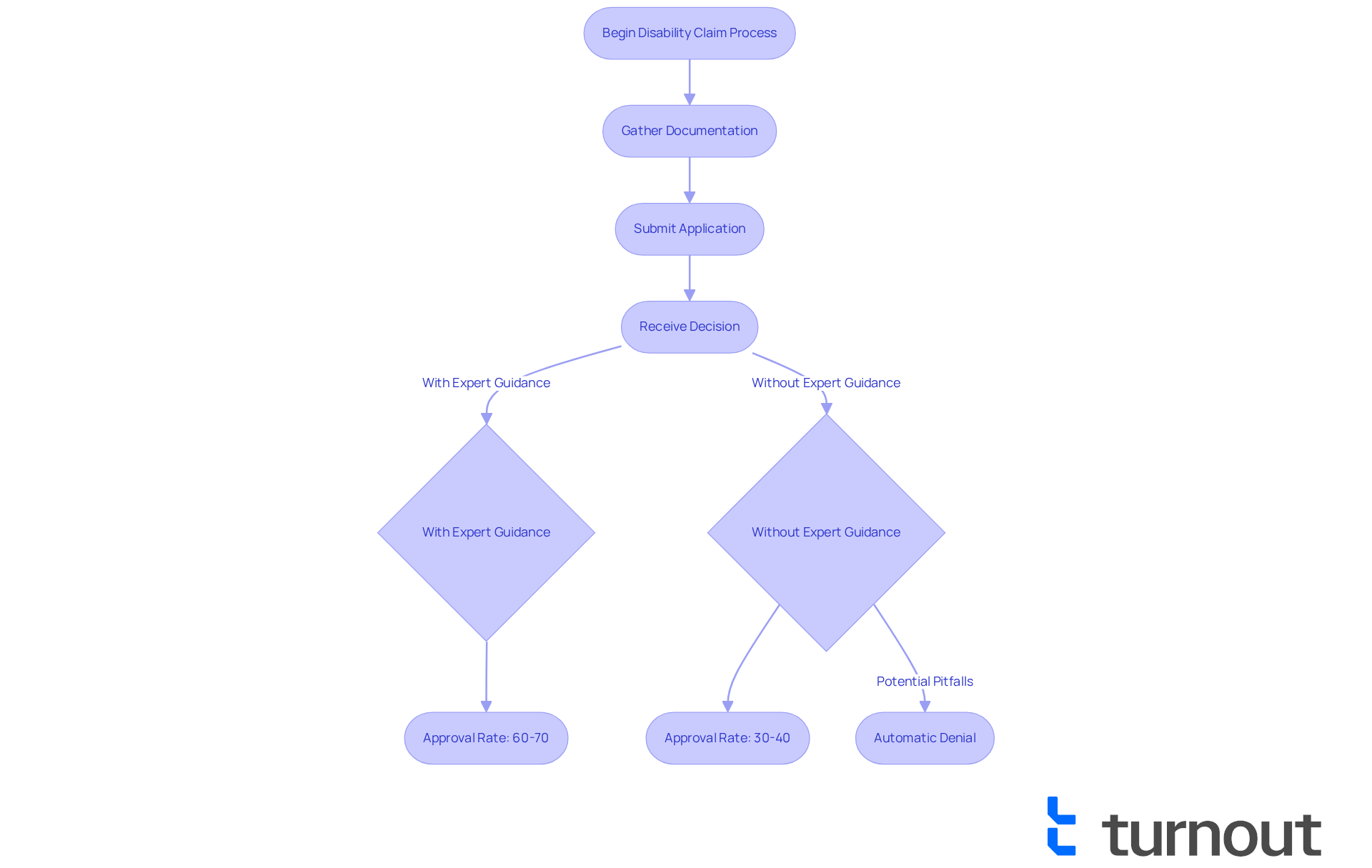
Increased Success Rates: The Impact of Representation on Claim Outcomes
We understand that navigating the disability claims process can be overwhelming. Research consistently shows that individuals who enlist a representative for disability achieve significantly higher success rates. In fact, statistics reveal that claimants with professional support are much more likely to have their initial applications approved, which minimizes the need for lengthy appeals.
Imagine this: initial application approval rates can improve from around 21% to as high as 35-40% with expert assistance. This heightened probability of success arises from the representative for disability's proficiency in:
- Developing strong applications
- Managing the intricacies of the submission system
- Efficiently communicating with pertinent agencies
By leveraging their knowledge and experience, representatives can substantially enhance your chances of a favorable outcome.
You are not alone in this journey. With the right support, potential rejections can transform into successful claims. We're here to help you navigate this process with confidence.
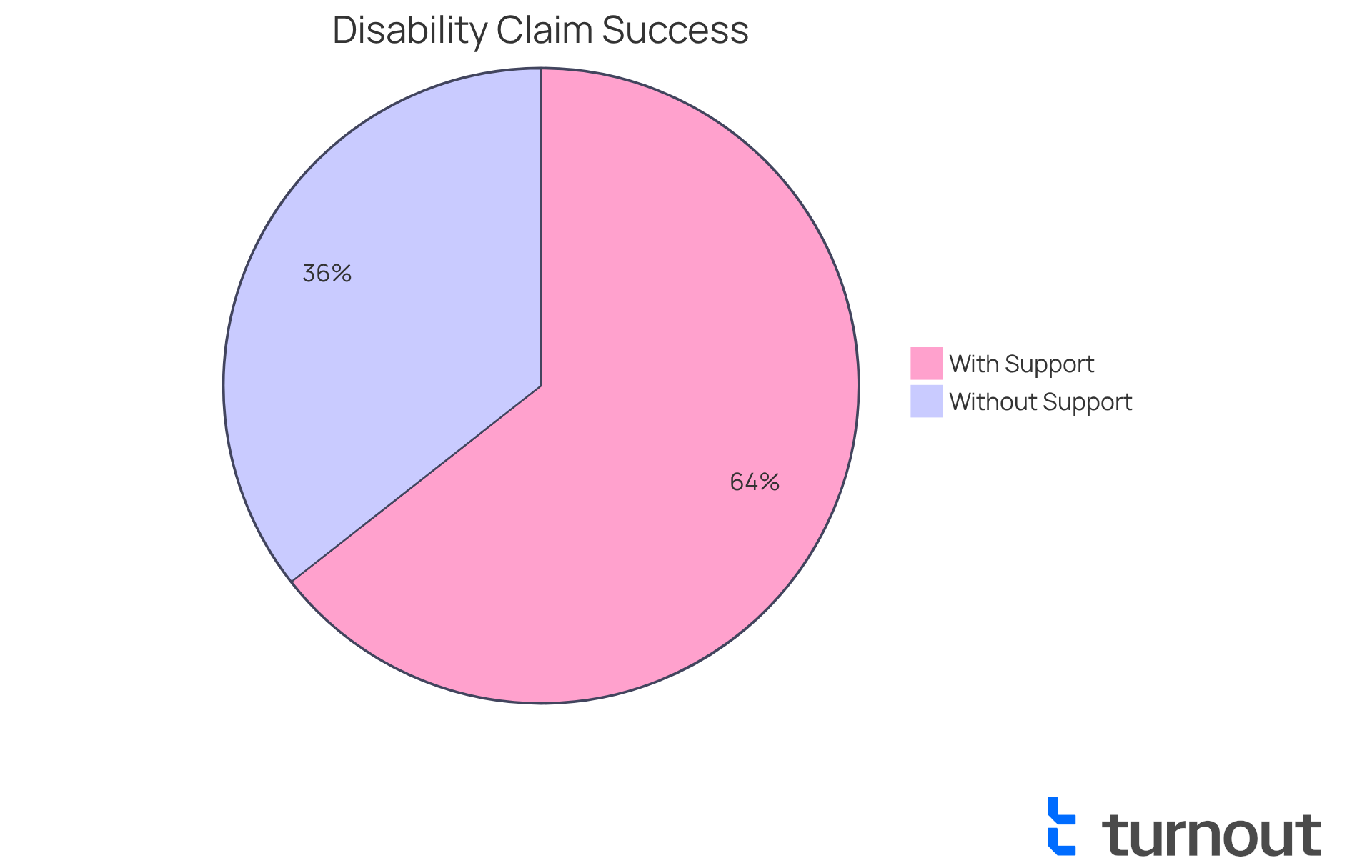
Emotional Support: How Representatives Alleviate Stress During Claims
Navigating the application procedure for disability benefits can be emotionally exhausting. It’s common to feel uncertain and anxious during this time. That’s where a representative for disability, including Turnout's trained non-professional advocates, comes in. They provide not just practical assistance but also vital emotional support, helping you manage stress and stay focused on your goals.
By offering guidance and encouragement, these advocates enable you to approach the process with a sense of tranquility and assurance. This emotional support is essential for maintaining motivation and resilience throughout what can often be a lengthy journey.
Research shows that adults with disabilities experience mental distress at rates significantly higher than those without. In fact, they face mental distress 4.6 times more often. Emotional support plays a key role in mitigating these challenges. Individuals with strong social support systems report lower levels of mental distress, emphasizing the importance of having a representative for disability who can provide both practical and emotional assistance.
Moreover, a representative for disability helps reduce the pressure associated with the application process. They oversee deadlines, organize paperwork, and ensure you’re updated at every stage. This proactive approach not only alleviates anxiety but also boosts your chances of a favorable outcome. By lifting some of the emotional burdens, representatives allow you to focus on your health and well-being, leading to a more effective claims experience.
It’s important to note that this entity is not a legal practice and does not offer legal representation. Additionally, the organization provides services related to tax debt relief, further assisting you in navigating complex financial systems. Remember, you are not alone in this journey; we’re here to help.
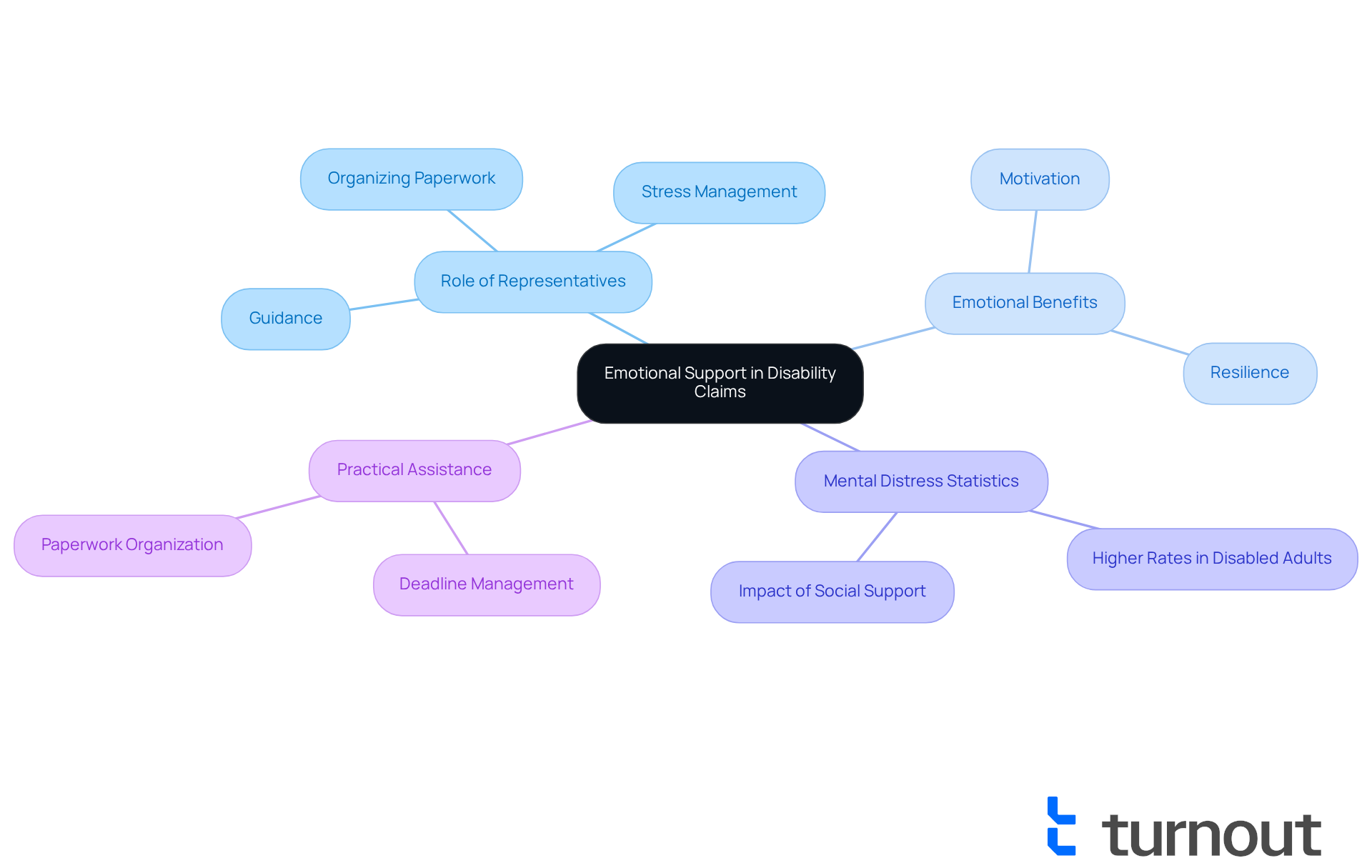
Legal Expertise: Navigating the Nuances of Disability Law
Navigating disability law can feel overwhelming. At our organization, we understand the challenges you face, and we’re here to help. We offer access to resources and services designed to assist individuals in managing these complexities, ensuring that your requests comply with all applicable laws and regulations. It’s important to note that while we provide support, we are not a legal practice and do not offer legal advice. Our trained nonlegal advocates are well-versed in the intricacies of the Social Security Administration's operations, ready to support your rights without providing legal representation. This expertise is vital in building strong cases that can withstand scrutiny and enhance your chances of approval.
Recent changes in disability law, particularly adjustments to Social Security Disability Insurance (SSDI) eligibility criteria, highlight the need for knowledgeable advocates. For example, the expected increase in the Substantial Gainful Activity (SGA) threshold in 2025 will allow disabled individuals to earn more while still qualifying for SSDI benefits. Our representatives are here to help you understand how these changes impact your requests and to support you throughout the application process.
The high rate of SSDI denials, especially for conditions like PTSD, underscores the necessity of effective representation. Research shows that individuals who have support from trained advocates are more likely to achieve favorable outcomes. While SSDI requests are often denied, these decisions can be contested. This is where our expert assistance becomes crucial, especially during the appeal stage. Our representatives can review denial notices, pinpoint weaknesses in submissions, and craft compelling narratives that align with the Social Security Administration's expectations. This proactive approach is essential as the SSDI application process becomes increasingly complex.
In addition to SSD services, we also offer assistance with tax debt relief, helping individuals manage their financial challenges. As the Massachusetts Special Commission on State Institutions calls for accountability regarding the mass institutionalization of persons with disabilities, the importance of advocacy has never been clearer. The role of our representative for disability in navigating these challenges is invaluable, providing the support and expertise needed to help you secure the benefits you deserve. Remember, you are not alone in this journey.
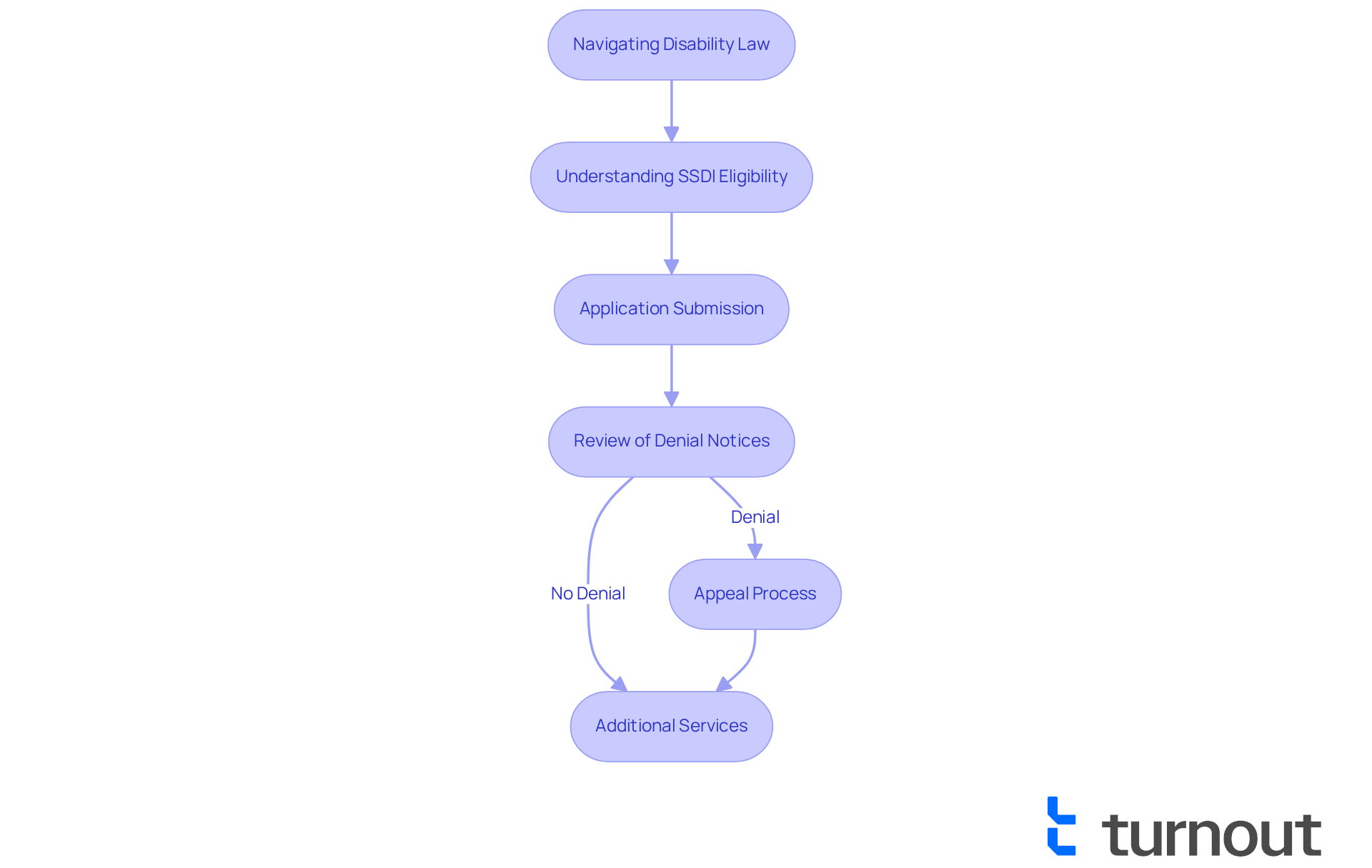
Timely Management: Ensuring Prompt Submission of Claims
Timeliness is crucial in the process when dealing with a representative for disability claims. We understand that delays can lead to missed deadlines and potential denials, which can be incredibly stressful. At Turnout, our trained nonlawyer advocates are here to help you manage these timelines effectively. They ensure that all necessary documentation is submitted promptly, meticulously tracking important dates and proactively following up with clients and agencies. This approach not only keeps your claim moving forward but also eases the burden of managing deadlines.
Research shows that having professional assistance early on can reduce overall case processing time by nearly a year. Imagine the relief of knowing that your claim is being handled efficiently, significantly enhancing your chances of a successful outcome. For instance, consider Jose, who faced multiple health issues and endured a lengthy five-year wait for his SSDI benefits. His experience underscores the importance of timely submissions.
By ensuring that all documentation is in order and submitted without delay, Turnout's trained nonlawyer advocates can serve as a representative for disability, helping you navigate the complexities of the system more effectively. You're not alone in this journey; we're here to support you every step of the way. Together, we can work towards faster approvals and better outcomes.
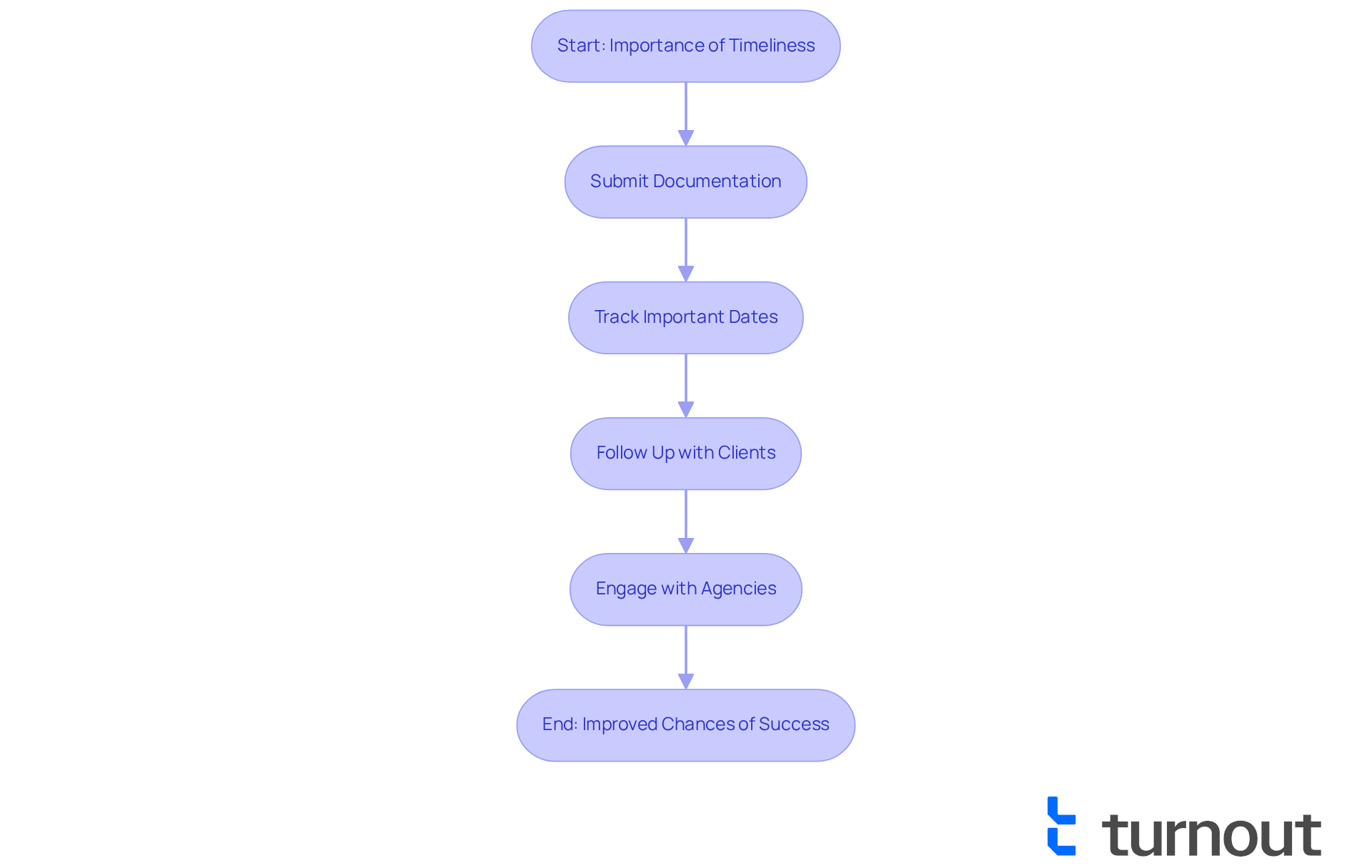
Documentation Support: Streamlining the Evidence Gathering Process
Collecting the necessary documentation is a crucial step in any disability application. We understand that this process can feel overwhelming. That's where a representative for disability plays a crucial role. They play a vital role in helping individuals recognize and gather essential medical records, personal statements, and other supporting evidence for their requests. With their deep understanding of what makes documentation strong, they guide clients in obtaining the most relevant information.
It's common to encounter documentation issues, such as:
- Missing recent clinical visits
- Incomplete functional assessments
- Vague provider statements
These gaps can prolong the handling of requests and lead to disappointing outcomes. By enhancing the evidence collection method, a representative for disability helps ensure that assertions are well-supported, increasing the chances of success. In fact, thoroughly documented assertions can experience a higher approval rate. Just look at the 523,834 awards to disabled workers in 2023, which represented 89 percent of all awards to disabled beneficiaries.
Recent changes to the submission system, including the introduction of QuickSubmit, have made it easier for representatives for disability to provide evidence efficiently. This tool allows users to upload larger files and more documents, improving the overall experience and reducing the likelihood of errors. By utilizing these advancements, a representative for disability can create a more seamless process, ultimately aiding their clients. As Franscino Crowelle, a public affairs expert, points out, "QuickSubmit is the most efficient way to submit evidence to VA," highlighting its importance in simplifying the documentation workflow.
Remember, you are not alone in this journey. We're here to help you navigate the complexities of the application process.
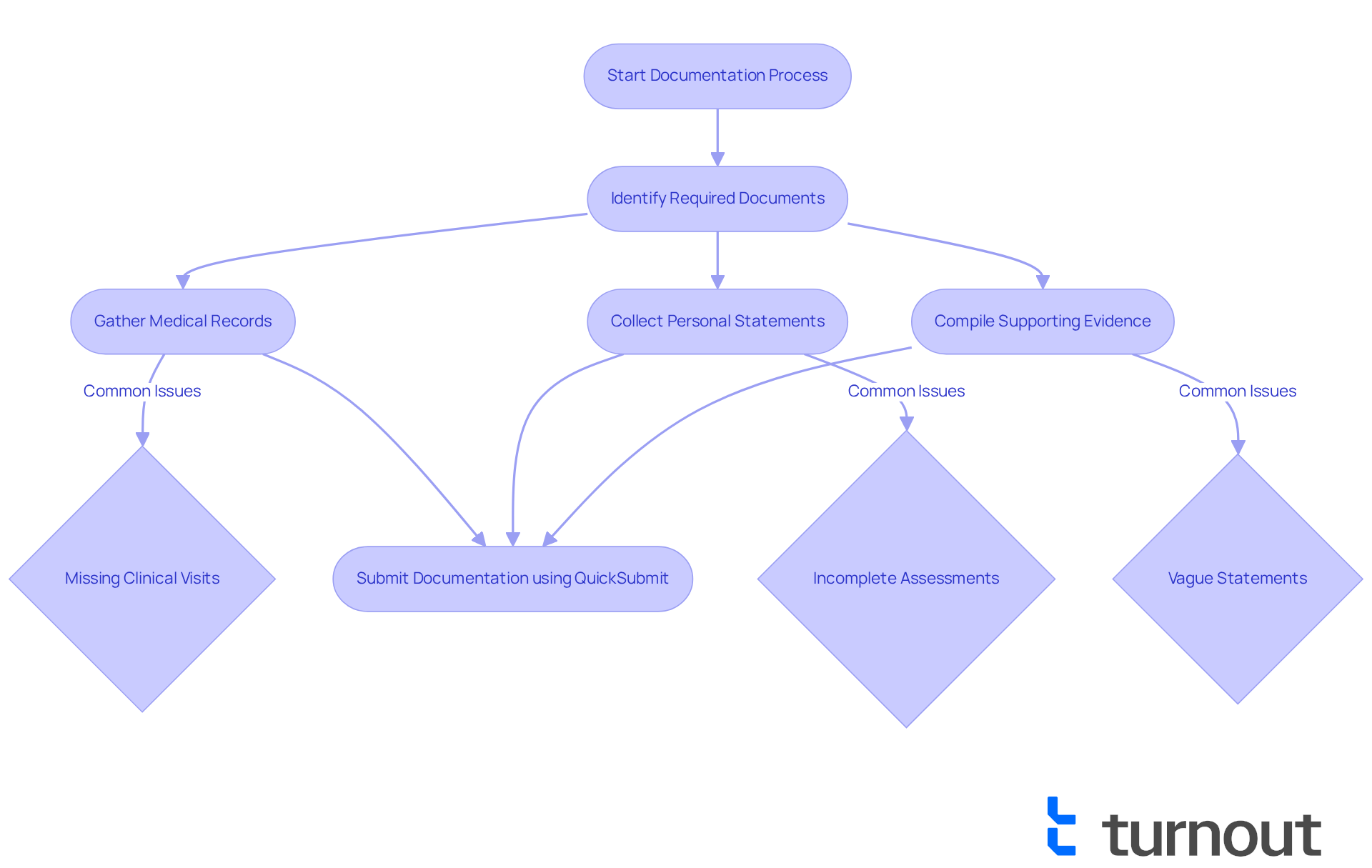
Advocacy in Hearings: The Representative's Role in Appeals
When claims are denied, it can feel overwhelming. We understand that navigating the appeals process is challenging, and that’s where our representative for disability can assist. They play a crucial role, especially during hearings, providing the support you need.
Our organization employs trained non-legal advocates who are dedicated to helping you every step of the way. They prepare you by outlining what to expect, assisting you in expressing your case, and presenting compelling arguments to decision-makers. With their deep understanding of the auditory process, they can handle inquiries and obstacles with ease, ensuring your rights and interests are well-represented.
It’s important to note that while we offer invaluable support, we are not a law firm and do not provide legal representation. However, having a skilled representative for disability by your side can dramatically influence the outcome of your appeal. Did you know that approval rates at the hearing level reach 51%? That’s significantly higher than the 15% approval rate at the reconsideration stage. With our advocates, you’re not just better positioned to succeed; you’re empowered.
As one spokesperson wisely noted, "Collaborating with a skilled supporter can significantly enhance your likelihood of success in the appeals procedure." This highlights our commitment to empowering individuals through expert guidance. Remember, you are not alone in this journey. We’re here to help you navigate the appeals process with confidence.
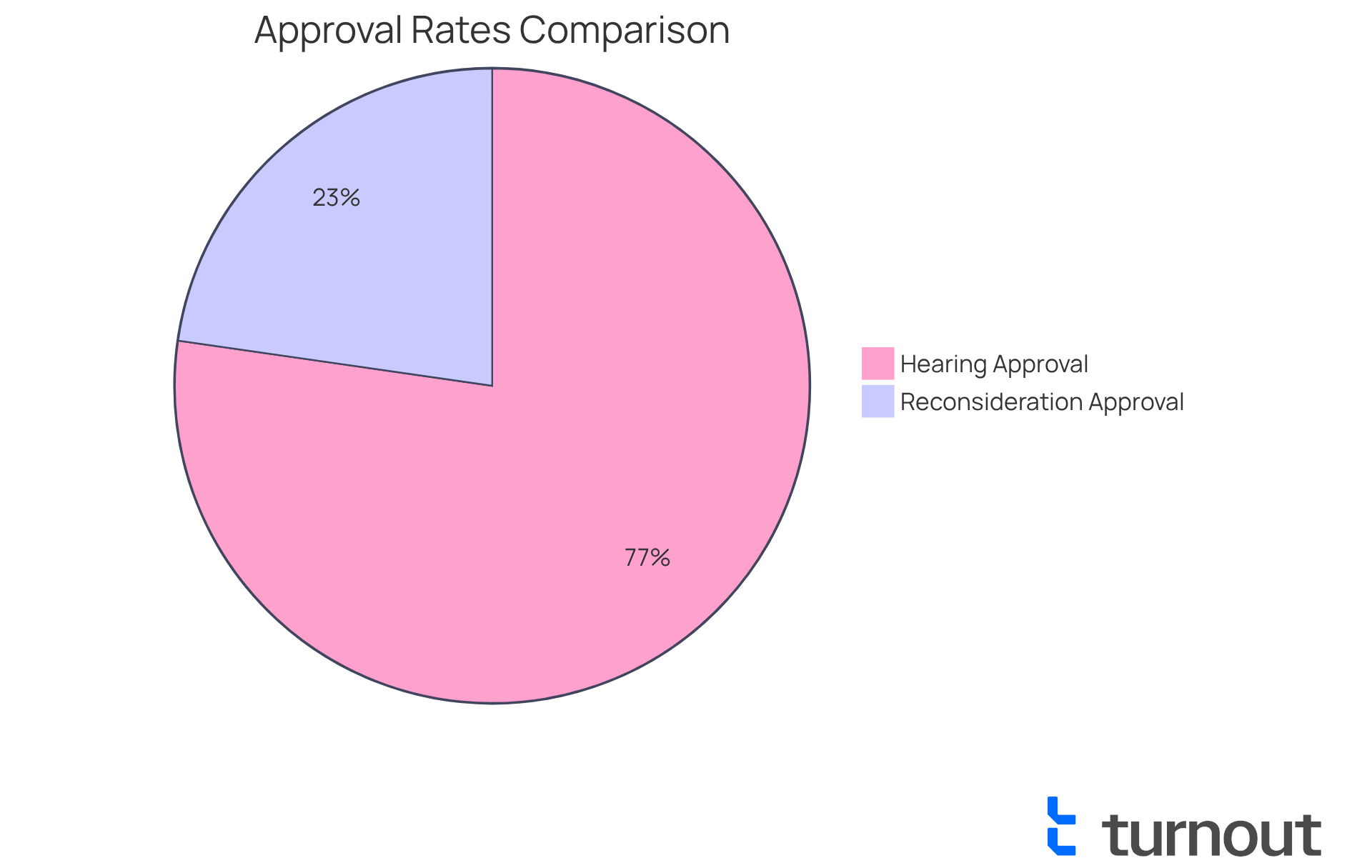
Cost-Effectiveness: Understanding the Financial Benefits of Representation
We understand that concerns about the costs of hiring a representative are common. However, it’s important to recognize that the financial benefits often outweigh these worries. Many representatives, including those at Turnout, work on a contingency basis. This means they only get paid if your request is successful, aligning their interests with yours and motivating them to achieve the best possible results.
Statistics show that individuals with support are nearly 70% more likely to have their requests approved during the initial assessment stage. Plus, having a representative can cut down the overall case processing time by more than 10 months, allowing you to access benefits sooner.
It’s essential to note that Turnout is not a legal practice and does not provide legal representation. Instead, they utilize trained nonlawyer advocates for SSD claims and collaborate with IRS-licensed enrolled agents for tax debt relief. The financial implications can be significant. For example, if a claimant is awarded back-due benefits of $50,000, the fee is capped at $9,200. This makes it a manageable expense compared to the potential financial relief you could gain.
Moreover, customers often incur no charges unless they receive benefits, making representation a valuable investment in your future. As Rick Fleming wisely states, "Contingency fees allow these clients to get the help they need to try to obtain the benefits they may deserve without having to pay up front." This arrangement not only eases the burden of managing complex requests but also enhances your chances of securing vital financial assistance.
If you’re considering hiring a representative, remember that seeking a complimentary case assessment from a consulting service can be a beneficial first step. You are not alone in this journey, and we’re here to help.
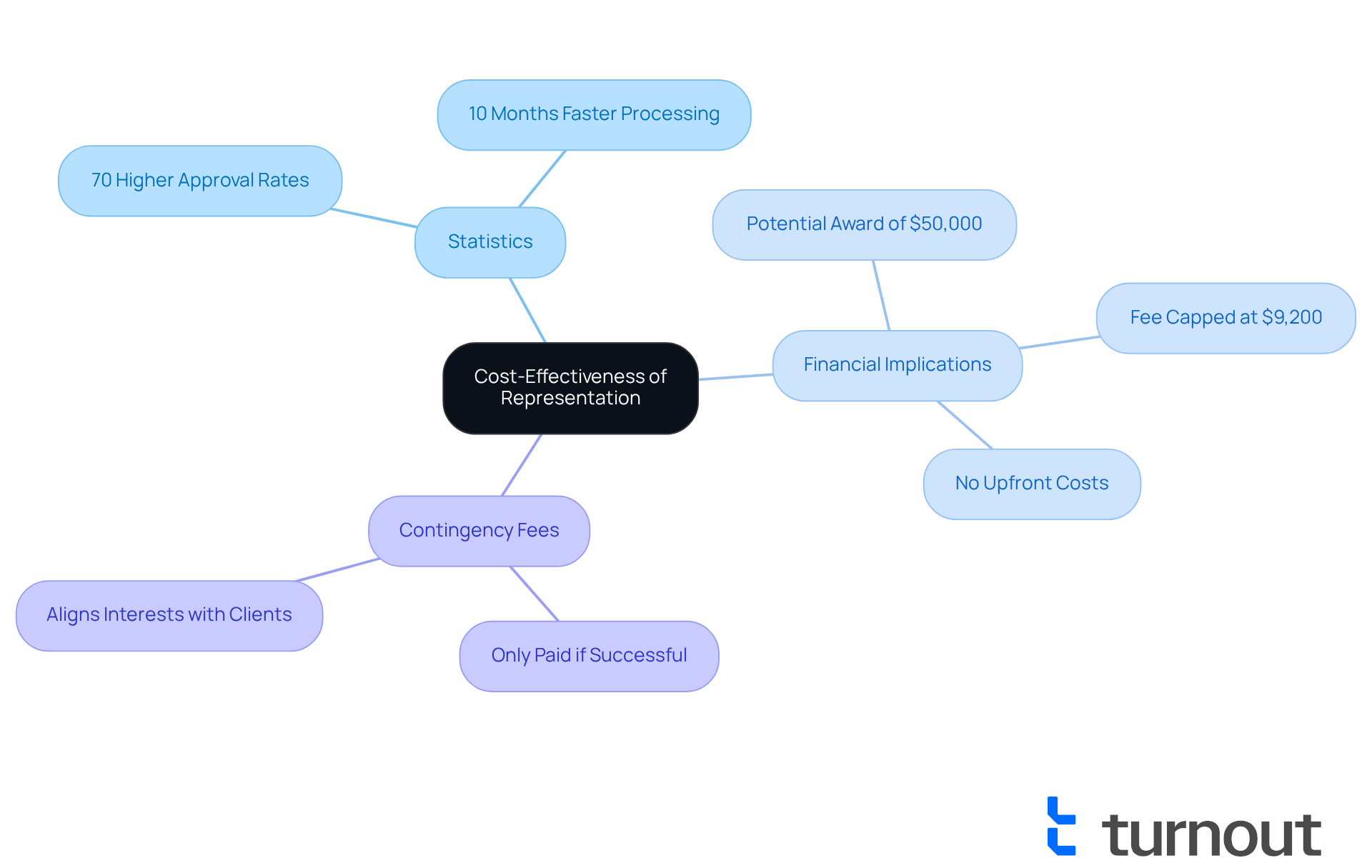
Peace of Mind: The Assurance of Professional Representation
Navigating the disability application process can feel overwhelming. It's common to experience uncertainty and anxiety during this time. At Turnout, we understand these challenges, and we're here to help. Our skilled non-professional advocates focus on assisting individuals with Social Security Disability (SSD) requests, providing the reassurance you need through expert advice.
Importantly, Turnout is not a legal practice and does not offer legal guidance. This clarity ensures you understand the nature of the assistance you receive. With this support, you can concentrate on your health and wellness, rather than getting lost in the complexities of your requests. Our representatives for disability are dedicated to reducing the anxiety linked to the process, empowering you to tackle your requests with confidence.
Moreover, having professional representation can significantly increase your chances of success in disability appeals. Claimants represented by advocates win appeals at rates 20-25% higher. We recognize the emotional toll that a denial can take; it can be devastating. That's why having support during such challenging times is invaluable.
Sustaining regular communication with healthcare professionals and maintaining detailed medical records are also crucial for enhancing your disability requests. Consulting with a representative for disability from Turnout for a personalized assessment of your claim can be a beneficial step towards achieving a successful outcome. Remember, you are not alone in this journey; we’re here to support you every step of the way.
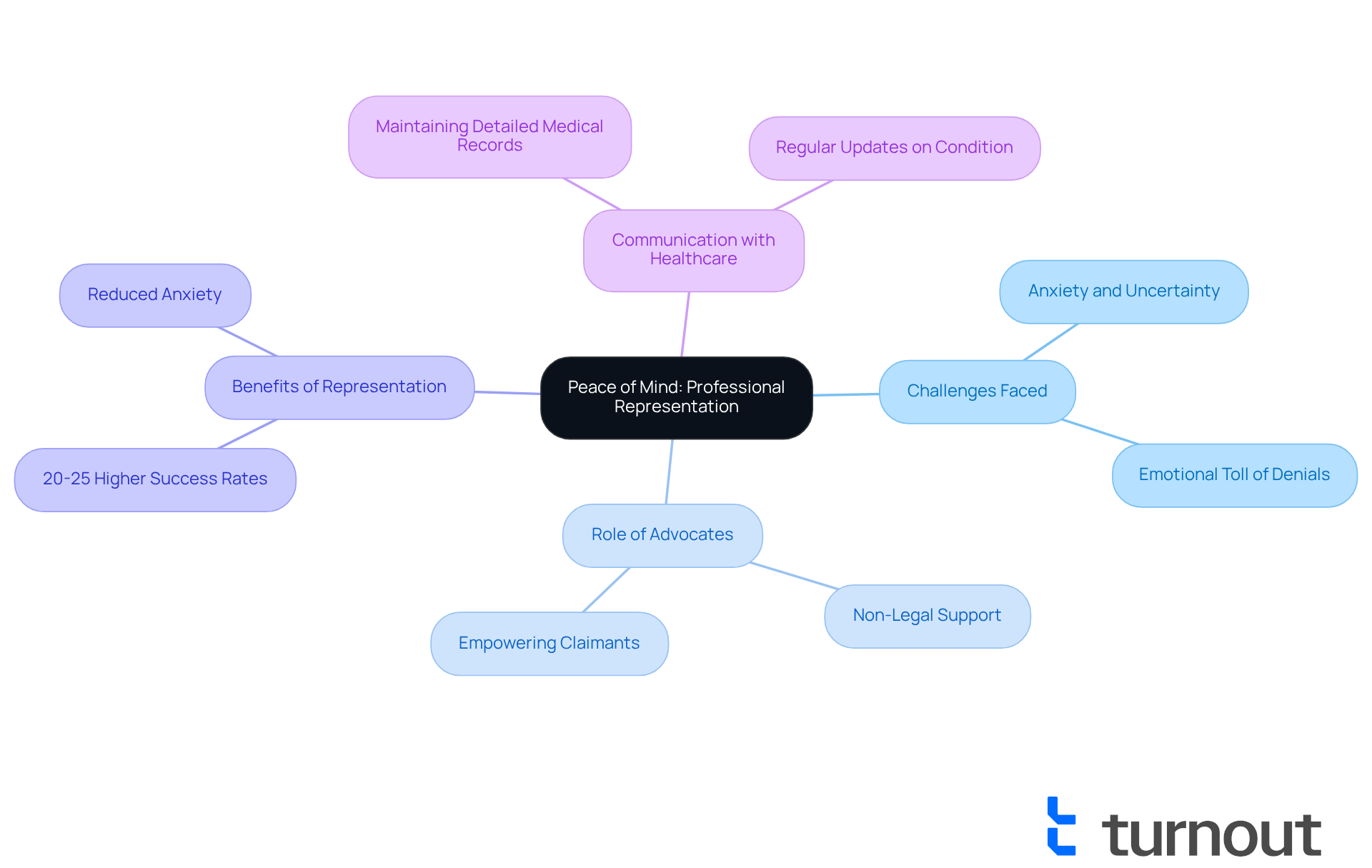
Conclusion
Navigating the complexities of disability claims can feel overwhelming, but you don’t have to face it alone. The support of a representative can truly make a difference. This article highlights the many benefits of enlisting a professional advocate, including:
- Increased success rates
- Emotional support
- Timely management
- Expert guidance
By leveraging the skills and knowledge of trained nonlegal representatives, you can approach the claims process with greater confidence and clarity, ultimately enhancing your chances of securing the benefits you deserve.
We understand that the journey can be tough. Statistics show that initial application approval rates improve significantly with professional assistance. Emotional support is crucial in alleviating the stress that often accompanies this process. Furthermore, representatives expertly navigate the timely management of documentation and legal nuances, ensuring that you are well-prepared and informed at every step.
In conclusion, you don’t have to navigate the journey through disability claims alone. The advantages of hiring a representative go beyond mere statistics; they encompass emotional well-being, financial implications, and a greater likelihood of success. If you’re considering this path, seeking assistance from a trained advocate can be a transformative step towards achieving the benefits you rightfully deserve. Embrace the support available and take charge of your claims process with confidence. Remember, we’re here to help.
Frequently Asked Questions
What is Turnout and how does it assist with disability claims?
Turnout is an AI-powered platform designed to help individuals navigate the disability claims process more efficiently. It provides timely support and guidance, utilizing an AI system named Jake to manage case specifics, deadlines, and communications, allowing representatives to focus on personalized interactions and strategic decision-making.
Why is expert guidance important in the disability claims process?
Expert guidance is crucial because navigating disability claims involves complex regulations and documentation requirements. Having professional support helps applicants avoid common pitfalls, adhere to requirements, and present compelling cases for benefits, significantly improving their chances of approval.
What are the approval rates for disability claims with and without expert assistance?
Only 21% of initial Social Security disability applications receive approval without assistance, reflecting a denial rate of about 64%. In contrast, claims with professional help can achieve approval rates of 60-70% at the hearing level, compared to 30-40% for those without support.
What common mistakes can lead to automatic denials in disability applications?
Frequent mistakes include inadequate medical documentation, missed deadlines, and neglecting to follow recommended treatment. These issues can result in automatic denials, making it essential to have informed guidance throughout the application process.
How has the complexity of disability requests changed over time?
The complexity of disability requests has increased significantly, with a 200% rise in original submissions featuring eight or more medical issues over the past decade. This growing complexity highlights the need for expert representation to ensure all documentation is complete and applicants are well-prepared for hearings.
How does having a representative for disability impact claim outcomes?
Having a representative for disability can greatly enhance success rates, with initial application approval rates improving from approximately 21% to 35-40% with expert assistance. Representatives leverage their knowledge to develop strong applications, manage submission intricacies, and communicate effectively with relevant agencies.
What support does Turnout offer to individuals navigating the claims process?
Turnout offers expert advice, skilled nonlegal advocates for SSD applications, and an AI-driven system that simplifies operations. Their support aims to empower individuals to navigate the disability claims process with greater confidence and clarity.




